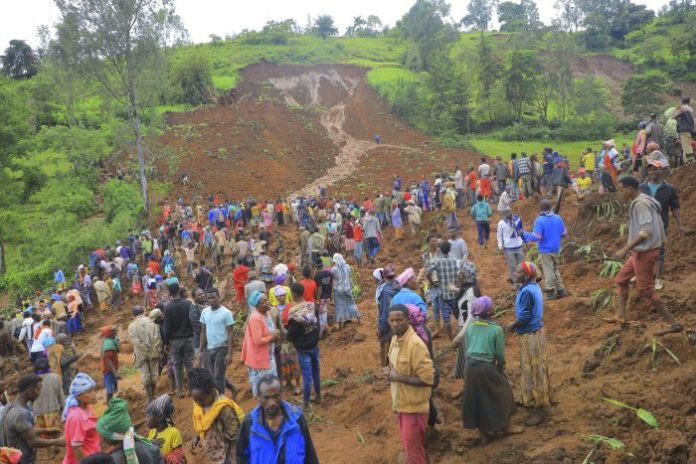Facebook Twitter (X) Instagram Somali Magazine - People's Magazine
On July 24, 2024, the southern region of Gofa, Ethiopia, experienced torrential rains that led to catastrophic landslides. The lush hillsides, once teeming with life, turned treacherous as the saturated soil gave way, burying homes, roads, and entire communities under a thick layer of mud from the Ethiopia landslide.
Rescue Efforts and Grim Discoveries from the Ethiopia landslide
Rescue teams, including local authorities, volunteers, and humanitarian organizations, mobilized swiftly. Their tireless efforts in the face of adversity have been nothing short of heroic. Using shovels, bare hands, and heavy machinery, they painstakingly dug through the debris, hoping to find survivors. But as the hours turned into days, hope waned, and the grim reality set in: most of those trapped were unlikely to be alive.
The Toll on Ethiopia landslide on Families and Communities
The 229 bodies recovered represent not just numbers but lives—each with a story, dreams, and loved ones left behind. Families mourn their losses, grappling with grief and shock. Entire neighborhoods have been obliterated, leaving scars on the landscape and hearts of those who survived.
Climate Change and Vulnerability
This tragedy is a stark reminder of the vulnerability of communities in regions prone to natural disasters. Ethiopia, like many other countries, faces the dual challenge of climate change and inadequate infrastructure. Extreme weather events, such as heavy rainfall and landslides, are becoming more frequent and severe. The consequences are devastating, especially for those living in poverty or in areas with limited resources.
Calls for Preparedness and Resilience
As we mourn the lives lost in this disaster, we must also take action. Governments, NGOs, and international bodies must collaborate to:
- Invest in Early Warning Systems: Timely alerts can save lives. Implementing effective early warning systems can help communities evacuate before disaster strikes.
- Strengthen Infrastructure: Roads, bridges, and housing need to be built with resilience in mind. Proper land-use planning can reduce the risk of landslides.
- Promote Reforestation: Trees stabilize soil and prevent erosion. Reforestation efforts can mitigate the impact of heavy rains on vulnerable slopes.
- Educate Communities: Awareness campaigns on disaster preparedness, evacuation routes, and safe practices are crucial.
The Ethiopia landslide is not an isolated incident. It is part of a global pattern—a wake-up call for humanity. We must recognize that climate change exacerbates natural hazards, disproportionately affecting the most marginalized. Our response should be swift, compassionate, and collaborative.
As the world mourns the loss of 229 lives in Gofa, let us also honor their memory by working together to build a safer, more resilient future for all.

